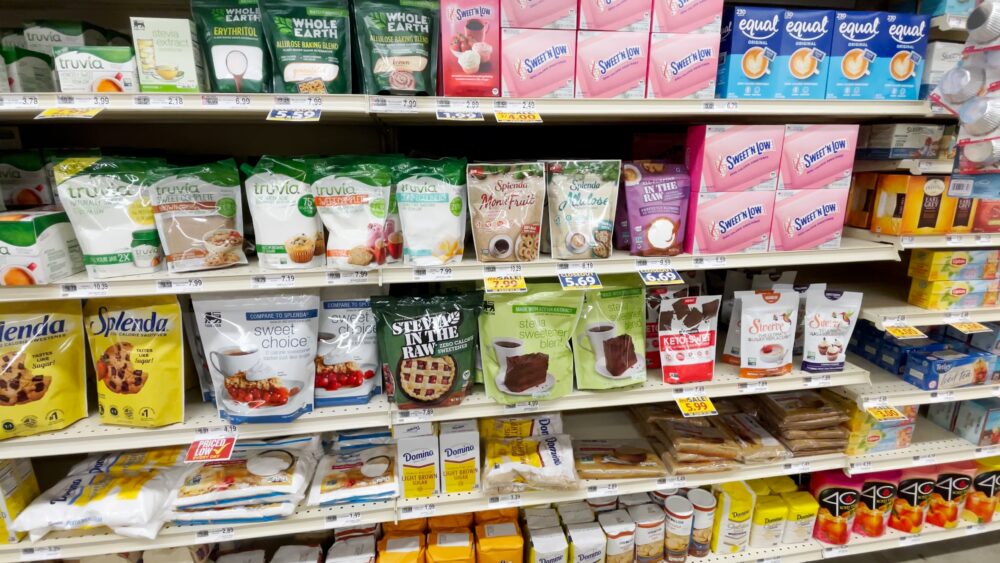The foods doing the most damage are often the ones you eat without a second thought.

You can be doing all the right things—drinking water, exercising, even taking probiotics—and still feel bloated, sluggish, or backed up. It’s not always a big, dramatic food intolerance causing trouble. Sometimes, it’s those “normal” foods you eat every day that slowly chip away at your digestive balance. They don’t raise red flags at first, but over time, they can leave your gut struggling to function the way it’s supposed to.
Digestive issues don’t always scream for attention. They often show up subtly—in the form of fatigue, brain fog, skin issues, or irritability. And if you’re not connecting the dots, you’ll keep eating what you’ve always eaten, wondering why you feel off. The truth is, your gut is a sensitive system. And it doesn’t take much to throw it into chaos. These twelve everyday foods might be the hidden saboteurs wrecking your digestion without you even realizing it.
1. Artificial sweeteners mess with your gut bacteria balance.

You might think swapping sugar for artificial sweeteners is a smart move, especially if you’re watching your weight, as reported by the authors at UHOne.com. But compounds like sucralose, aspartame, and saccharin don’t just pass through your system quietly. They actually disrupt the balance of bacteria in your gut, favoring the harmful strains while killing off the good ones that support digestion and immune health.
Over time, this imbalance can lead to bloating, gas, and changes in bowel habits. Some studies even suggest these sweeteners can reduce insulin sensitivity and make your body crave more sugar. So while they might save you a few calories up front, they may cost you your gut’s overall function and stability. If you’re reaching for diet sodas, sugar-free gums, or low-calorie snacks every day, it might be time to reconsider.
2. Dairy products often trigger low-level inflammation.

Even if you’re not fully lactose intolerant, dairy can be a quiet troublemaker in your digestive system. Many people have a limited ability to break down lactose as they age, leading to subtle issues like bloating, cramping, or irregularity, according to the writers at the Mayo Clinic. It doesn’t always show up as a full-blown reaction—it can be just enough to leave your gut feeling off.
Cheese, milk, and ice cream are comfort foods, but they come with a cost if your body can’t process them efficiently. Some types of dairy also promote mucus production and low-grade inflammation, which can interfere with nutrient absorption. You don’t need to swear off dairy completely, but if you constantly feel sluggish or gassy after consuming it, your gut might be trying to tell you something.
3. Fried foods slow digestion and feed the wrong microbes.

There’s no denying fried foods are satisfying. Crispy textures and rich flavors are hard to resist. But deep-fried meals loaded with unhealthy oils are one of the worst culprits when it comes to digestive distress, as stated by Karen McDonnell. They’re heavy, slow to break down, and often linger in your stomach much longer than they should, making you feel weighed down and uncomfortable.
On top of that, fried foods feed the less beneficial bacteria in your gut—those linked with inflammation and poor nutrient absorption. Think of greasy burgers, fries, and fast-food breakfast sandwiches as fuel for digestive chaos. You might not notice the damage right away, but over time, your gut’s delicate balance shifts in the wrong direction. Cutting back can make a bigger difference than you’d expect.
4. Refined grains rob your gut of fiber and nutrients.

White bread, pasta, pastries, and crackers made with refined flour might taste great, but they’ve been stripped of nearly all their fiber and nutritional value. Without fiber, your digestive system has a harder time keeping things moving. And without nutrients, your gut lining doesn’t get what it needs to repair and function properly.
These foods also digest quickly, spiking blood sugar and feeding bacteria that thrive on simple carbs. That imbalance can lead to bloating, irregular bowel movements, and even brain fog. If you rely heavily on refined grains every day, your gut isn’t getting the support it needs. Swapping in whole grains makes a huge difference over time—and your stomach will thank you for it.
5. Processed meats fuel inflammation and sluggish digestion.

Deli slices, bacon, hot dogs, and sausage might be easy and delicious, but they come with some major digestive downsides. These meats are full of preservatives like nitrates and nitrites, which can irritate the gut lining and contribute to inflammation. That low-grade inflammation builds slowly, and you might just feel a bit off without realizing what’s causing it.
Processed meats also tend to be high in fat and low in fiber—two things that make digestion drag. Your gut has to work harder to break them down, and if your microbiome isn’t thriving, things get even more complicated. Eating these regularly can lead to constipation, bloating, and a feeling of general heaviness. They’re fine in small doses, but they shouldn’t be an everyday staple.
6. Coffee overload irritates the digestive tract.

A morning cup of coffee might help you feel human again, but drinking too much—especially on an empty stomach—can wear down your gut. Coffee is acidic and can irritate the stomach lining over time, especially for those with sensitive systems. It also stimulates gastric acid, which can throw off your digestion if consumed in large amounts or without food.
It’s not just about how much coffee you drink—it’s how and when you drink it. If you rely on multiple cups a day, especially without balancing it with enough water or food, it can lead to acid reflux, stomach cramps, or loose stools. For people with underlying digestive issues, scaling back can be surprisingly helpful. Moderation really is the sweet spot with caffeine.
7. Alcohol disrupts the gut lining and microbiome.

A glass of wine or a cold beer now and then probably won’t wreck your gut, but regular alcohol intake is a different story. Alcohol damages the protective lining of your intestines, making it easier for harmful substances to pass into your bloodstream. This “leaky gut” effect leads to inflammation that affects more than just your stomach—it can impact your whole body.
Alcohol also throws your microbiome out of balance, reducing healthy bacteria and encouraging the growth of the bad stuff. That disruption can affect everything from digestion to mood to immunity. If you drink regularly and often feel gassy, bloated, or off afterward, your gut might be reacting more than you think. Giving it a break—even just a few days a week—can help it recover.
8. Sugar feeds harmful bacteria and yeast.

It’s no secret sugar isn’t great for your body, but your gut especially takes a hit. When you consume a lot of added sugar—think sodas, candies, sweetened cereals—it feeds harmful bacteria and yeast in your digestive tract. These bad microbes thrive on sugar, crowding out the beneficial ones and creating an imbalanced environment.
This imbalance can lead to digestive symptoms like bloating, irregularity, and even cravings that push you to eat more sugar. It becomes a vicious cycle. And it’s not just obvious sweets—sugar hides in sauces, snacks, and even “healthy” energy bars. Cutting back helps your gut restore its natural balance, giving the good bacteria a better shot at thriving again.
9. Raw cruciferous vegetables can be tough on sensitive guts.

Broccoli, cauliflower, cabbage, and Brussels sprouts are packed with nutrients, but they’re also high in insoluble fiber and difficult-to-digest sugars. When eaten raw, they can ferment in the gut, producing gas and discomfort, especially for people with IBS or sensitive stomachs. That fiber isn’t necessarily bad—it’s just intense if your digestion is already struggling.
Cooking these vegetables can make them much easier to tolerate. Steaming or roasting helps break down some of the fibers and sugars, making them gentler on your system. If you’ve been force-feeding yourself raw salads and wondering why your stomach keeps fighting back, the raw cruciferous gang might be to blame. It’s all about preparation and timing.
10. Packaged snacks are loaded with gut-irritating additives.

Chips, granola bars, protein snacks—they’re convenient, but many of them are packed with preservatives, artificial colors, and emulsifiers. These ingredients may help with shelf life and texture, but they don’t do your gut any favors. Some emulsifiers, in particular, have been linked to changes in gut bacteria and increased inflammation.
Even snacks that seem healthy can include gums, fillers, and fake fibers that don’t break down properly. Your gut might react with bloating, irregularity, or a feeling of general unease. If you’re snacking all day and feeling off without a clear reason, check the labels. Sometimes it’s not the food itself—it’s what’s hiding in the ingredients list that’s causing trouble.
11. Carbonated drinks create excess pressure in your gut.

Sodas and sparkling waters might feel refreshing, but they bring a lot of gas into your system—literally. The bubbles can cause bloating, belching, and abdominal discomfort, especially if you drink them quickly or with meals. For people with digestive sensitivity, this extra gas can throw everything off balance and trigger symptoms that linger.
The sugar and acids in sodas add another layer of irritation, weakening the gut lining and altering your gut flora over time. Even if you’re drinking zero-calorie or flavored options, the carbonation still affects your stomach. If you deal with bloating or pressure regularly, cutting back on fizzy drinks might be a small tweak with a big payoff.
12. Fruit juice seems healthy but strips away what matters.

You might think starting your day with orange juice is doing your body a favor, but most fruit juices are just concentrated sugar without the fiber your gut actually needs. Without the fiber, sugar hits your system fast, causing spikes in blood sugar and feeding bacteria that thrive on quick, easy fuel. Over time, that imbalance throws your digestive rhythm off.
Even natural juices lack the complexity of whole fruits. They fill you up quickly, but don’t give your gut the exercise of breaking down fiber-rich pulp. That lack of activity weakens digestion and can lead to slower motility or inconsistent bowel movements. If you want the nutrients, eat the whole fruit. Your gut will do better with the challenge.
